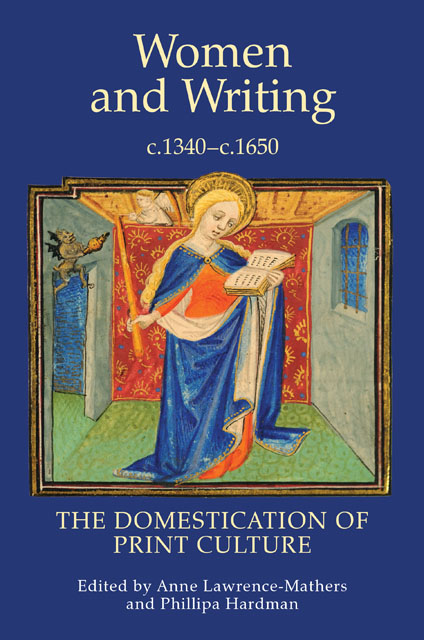Book contents
- Frontmatter
- Contents
- List of Plates
- List of Contributors
- Abbreviations
- Introduction
- Domestic Learning and Teaching: Investigating Evidence for the Role of ‘Household Miscellanies’ in Late-Medieval England
- Domesticating the Calendar: The Hours and the Almanac in Tudor England
- ‘a briefe and plaine declaration’: Lady Anne Bacon’s 1564 Translation of the Apologia Ecclesiae Anglicanae
- Frances Wolfreston’s Chaucer
- Commonplace Book Culture: A List of Sixteen Traits
- Women, Politics and Domesticity: The Scribal Publication of Lady Rich’s Letter to Elizabeth I
- ‘yr scribe can proove no nessecarye consiquence for you’?: The Social and Linguistic Implications of Joan Thynne’s using a Scribe in Letters to her Son, 1607–11
- Fathers and Daughters: Four Women and Their Family Albums of Verse
- The Book as Domestic Gift: Bodleian MS Don. C. 24
- ‘like hewen stone’: Augustine, Audience and Revision in Elizabeth Isham’s ‘Booke of Rememberance’ (c. 1639)
- Female Voices in Early Seventeenth Century Pamphlet Literature
- Select bibliography
- Index
- Misscellanious Endmatter
‘a briefe and plaine declaration’: Lady Anne Bacon’s 1564 Translation of the Apologia Ecclesiae Anglicanae
Published online by Cambridge University Press: 01 March 2023
- Frontmatter
- Contents
- List of Plates
- List of Contributors
- Abbreviations
- Introduction
- Domestic Learning and Teaching: Investigating Evidence for the Role of ‘Household Miscellanies’ in Late-Medieval England
- Domesticating the Calendar: The Hours and the Almanac in Tudor England
- ‘a briefe and plaine declaration’: Lady Anne Bacon’s 1564 Translation of the Apologia Ecclesiae Anglicanae
- Frances Wolfreston’s Chaucer
- Commonplace Book Culture: A List of Sixteen Traits
- Women, Politics and Domesticity: The Scribal Publication of Lady Rich’s Letter to Elizabeth I
- ‘yr scribe can proove no nessecarye consiquence for you’?: The Social and Linguistic Implications of Joan Thynne’s using a Scribe in Letters to her Son, 1607–11
- Fathers and Daughters: Four Women and Their Family Albums of Verse
- The Book as Domestic Gift: Bodleian MS Don. C. 24
- ‘like hewen stone’: Augustine, Audience and Revision in Elizabeth Isham’s ‘Booke of Rememberance’ (c. 1639)
- Female Voices in Early Seventeenth Century Pamphlet Literature
- Select bibliography
- Index
- Misscellanious Endmatter
Summary
Madame, according to your request I haue perused your studious labour of translation profitably imploied in a right commendable work … And now to thende bothe to acknowledge my good approbation, and to spread the benefit more largely, where your Ladishippe hathe sent me your boke writen, I haue with most hearty thankes returned it to you (as you see) printed.
Thus wrote Matthew Parker, archbishop of Canterbury, in a letter to ‘the right honorable learned and vertuous Ladie A.B.’. The ‘Ladie A.B.’ in question is Lady Anne Bacon (1528–1610) and the letter was appended to her translation of John Jewel’s Apologia Ecclesiae Anglicanae, published in 1564. The translation deserves closer attention than it has so far received. At first sight, Parker’s dedicatory epistle portrays the translation as a semi-private manuscript work by a woman, which only accidentally found its way into print. Closer analysis reveals that whilst this translation was produced by a woman within a domestic setting, Anne Bacon had always envisaged a wider readership and was addressing concerns far beyond her own household in the work. This was a translation designed to remedy the dearth of preaching in the 1560s, providing a creed for the nascent Church of England. Anne deliberately wanted her message to appeal to as wide a readership as possible and so she turned to contemporary theories of translation to produce an authentically ‘English’ voice in her text. Female religious translations have often been considered as evidence of the silencing of women’s voices in print culture. This essay will instead argue that detailed analysis of Anne Bacon’s translation of the Apologia Ecclesiae Anglicanae reveals her ability to speak clearly on behalf of her own religious priorities.
An Apologie or answere in defence of the Churche of Englande was not the first published translation by Anne Cooke Bacon; between 1548 and 1551, her translations from Italian into English of nineteen sermons by the Italian reformer, Bernardino Ochino, were published in three different volumes. Knowledge of the classical and modern languages necessary for these acts of translation derived from the humanist education Anne and her sisters received from their father, Sir Anthony Cooke.
- Type
- Chapter
- Information
- Women and Writing, c. 1340-c. 1650The Domestication of Print Culture, pp. 62 - 76Publisher: Boydell & BrewerPrint publication year: 2010
- 3
- Cited by



